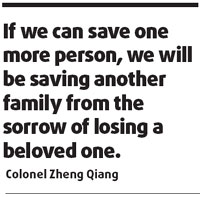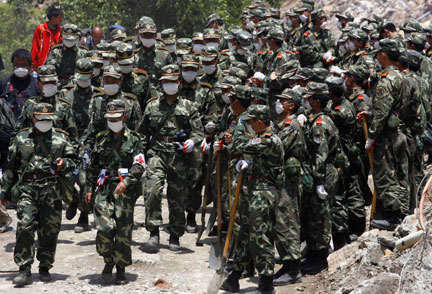Colonel turns into one-man rescue army
By Wang Ying (China Daily)
Updated: 2008-05-20 07:24
Updated: 2008-05-20 07:24
Colonel Zheng Qiang and his brothers-in-arms have saved 7,000 people in Beichuan county since the May 12 quake. But he could not save his 29 relatives who lived there.
A member of the Qiang ethnic minority, the 30-plus director of an armed forces department in Mianyang city, 73 km south of Beichuan county, has worked day and night to search for survivors in the rubble.
|
|
He has kept himself busy to forget the sorrow, at least temporarily, of losing so many of his beloved ones.
Zheng's bloodshot eyes and disheveled hair tell the story of the past six days. "There is still so much work to be done," he says. "If we can save one more person, we will be saving another family from the sorrow of losing a beloved one."
The May 12 quake shook Zheng's office building in Mianyang, but he didn't realize the magnitude of the devastation then. "Start the emergency relief plan and call on all units of the armed forces right away," Zheng announced just 10 minutes after the quake struck. Immediately a district earthquake relief headquarter was set up in Mianyang.
Zheng and his 250-member team's first job was to repair the cracks in a reservoir 10 km northeast of Mianyang.

After more than 20 hours of painstaking work, the team repaired the reservoir and walked non-stop to Beichuan to help with the relief work there.
"Though the walk to Beichuan took several hours, it seemed endless," Zheng says. Perhaps the delay in reaching his native county to find out about his and his wife's 36 relatives made the walk seem endless.
"On way to my hometown, a number of acquaintances kept giving me the bad news," Zheng says. "The news of my relatives' tragic death stabbed me in the heart."
But even that hadn't prepared him for what he saw. His beautiful hometown had been turned into rubble, with houses razed and rocks and mud blocking the river.
He, however, swung into action again, as soon as he heard cries of help from under the rubble of a building. "I just wanted to save lives."
Since no spade or other basic tools were available, Zheng and his team began digging with their bare hands. They did not stop even when their hands became bloodied.
To move the seriously injured, Zheng's team had to crawl a 2-km stretch on a steep mountain. Their progress was slowed down further because boulders and mudslides triggered by the constant rain had blocked the road.
Zheng's team joined about 1,000 villagers to form a life-chain, passing the improvised stretchers (made from doors and signboards) from one person to another.
The satisfaction of helping save more than 80 people and relocating thousands of others to safer places may give Zheng the strength to carry on his work despite losing so many of his relatives to the quake.
|
||
|
||
|
|
|
|
